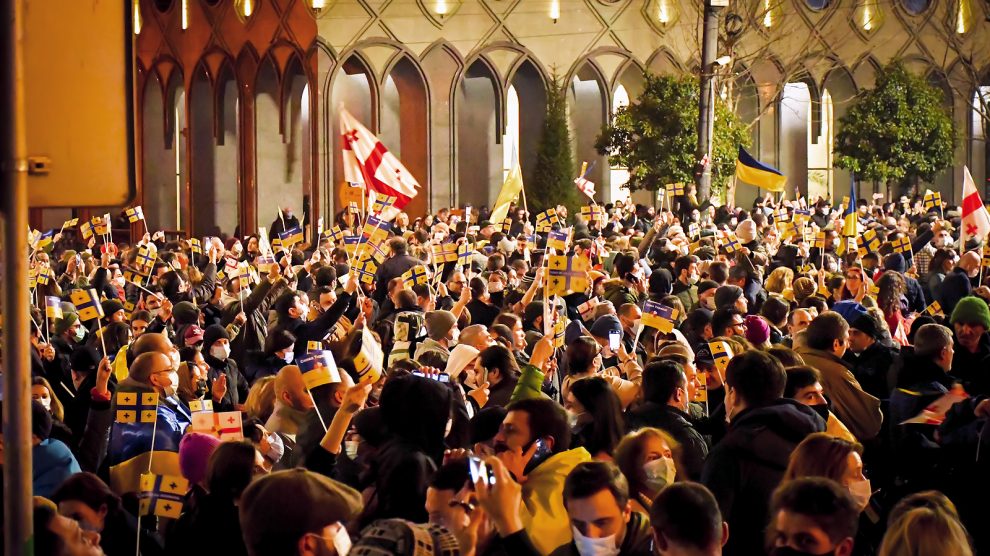Tbilisi’s decision to move ahead with the purchase of new metro cars from a Russian supplier and the perceived openness of Georgian officials to resuming direct flights to Russia have provoked a backlash – both domestically and from Western officials.
Back in 2021, Tbilisi announced funding from the European Bank for Reconstruction and Development (EBRD) for the 50 million US dollars purchase of 44 subway cars from Metrovagonmash, a Russian company deemed the most suitable to manufacture cars for Tbilisi’s Soviet-era metro.
However, after most Western countries imposed sanctions on Russia for its invasion of Ukraine, the EBRD announced it would stop payments to Metrovagonmash.
- For Georgia, there is no time for complacency
- Why Georgians are fighting in Ukraine
- How investors in Georgia’s tourism sector can benefit from the know-how of its pioneers
While the city of Tbilisi and EBRD looked for ways to reverse the deal, Tbilisi municipal officials announced last week that they would continue with the original agreement with Metrovagonmash to avoid financial loss. The Georgian media and its opposition leaders have heavily criticised Tbilisi’s handling of the deal.
Metrovagonmash is sanctioned by Kyiv but not included in other Western sanctions. Companies that service Russian airlines, however, are subject to Western sanctions.
Russia unilaterally banned direct flights to Georgia in 2019 after widespread protests took place when a Russian Duma deputy was allowed to address Georgia’s parliament. Recently, both Russian officials and high-ranking members of the governing Georgian Dream party have floated the idea of resuming flights.
On February 3, Georgian Dream Chairman Irakli Kobakhdize said, “If unilateral sanctions [the flight ban] are lifted by the Russian Federation, it will be welcome for us in the interests of our fellow citizens and countrymen”.
Last week, both the United States and the European Union publicly urged Georgia against resuming direct flights.
The US State Department told the Georgian service of Voice of America that, “we would be concerned about the resumption of flights between Russia and Georgia, given that companies at Georgian airports could be subject to sanctions if they serve aircraft subject to additional import and export controls”. An EU spokesperson urged Georgia to join the EU’s sanctions on Russia’s aviation industry.
Georgia has not imposed any of its own sanctions against Russia but says it is respecting Western sanctions.
Russian Foreign Minister Sergey Lavrov however has praised Georgia’s refusal to impose sanctions, saying, “We see that Georgia, like other countries of the world, is under pressure from the West, which openly and shamelessly demands they join the sanctions against Russia. This small country and its government have the courage to say that they will be guided by their own interests, economic interests, and this deserves praise”.
Georgia, Russia, and the War in Ukraine
Most Georgians consider the presence of Russian troops in the breakaway regions of Abkhazia and South Ossetia to constitute an occupation, by Russia, of 20 per cent of territory internationally recognised as Georgia. Ukrainian flags fly everywhere in Tbilisi, making the locals’ solidarity with Kyiv impossible to ignore.
Georgia’s economy, however, largely depends on Russian trade and tourism.
Georgia imports much of its oil, coal, and flour from Russia, and its imports from Russia are only increasing. In the first ten months of 2022, Georgia’s import of oil and petroleum products from Russia increased by 179 per cent compared to the same period in 2021. Total imports increased 74 per cent. Trade transiting Georgia has also increased since the start of the war in Ukraine; the volume of Russia-Turkey cargo that passed through Georgia tripled in the first half of 2022.
Goods and cargo aren’t the only thing exchanged between Georgia and Russia — people are, too. The World Bank ranks Georgia as the 21st-most dependent country on remittances in the world. Of the 4.4 billion US dollars of remittances sent home to Georgia in 2022, the National Bank has reported that over two billion US dollars were sent from Georgians working in Russia.

Russians in Tbilisi
Since the start of the war in Ukraine, Russians have also been moving to Georgia.
In 2012, just four years after its 2008 war with Russia, Georgia unilaterally abolished its visa regime with Russia in a bid to boost tourism from its northern neighbour.
The move, which allows Russians to stay in Georgia for a year without needing a visa, has allowed at least 100,000 Russians fleeing conscription and repression to move to Georgia since the war in Ukraine began almost a year ago.
Many more Russians entered Georgia en route to other countries, such as Armenia.
Rents in both Tbilisi and Yerevan have more than doubled since the war began, as many newly-arrived Russians make more than Georgians and Armenians and can afford to pay higher rents. Georgians and Armenians whose rent increased overnight but cannot pay the sharp increase are evicted.
Unsurprisingly, ever since the first wave of Russians arrived in Georgia last March, public opinion has been set against them. One survey found that 66 per cent of Georgians support reimposing a visa regime for Russians. As with anything else that might anger Moscow, the Georgian government looks unlikely to do so.
Unlike many news and information platforms, Emerging Europe is free to read, and always will be. There is no paywall here. We are independent, not affiliated with nor representing any political party or business organisation. We want the very best for emerging Europe, nothing more, nothing less. Your support will help us continue to spread the word about this amazing region.
You can contribute here. Thank you.







Add Comment